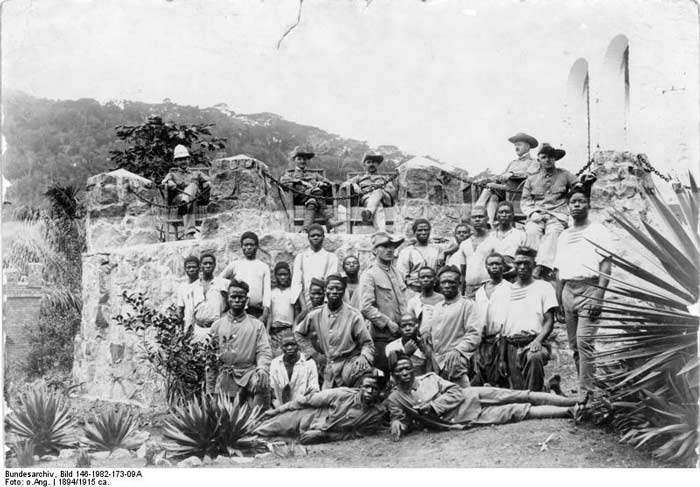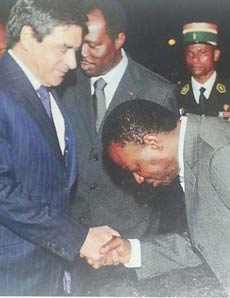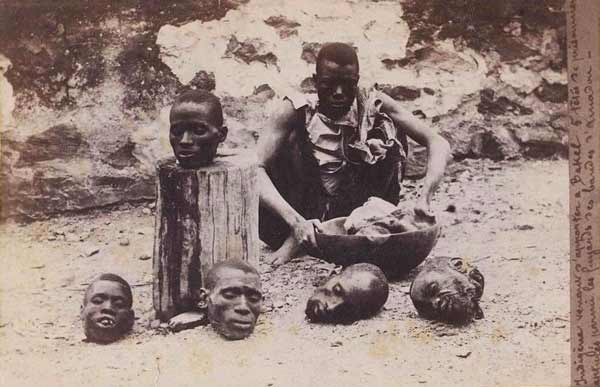
Kamerun – Ebolowa; between 1894 and 1915. Source: German Federal Archives
The Willie Lynch Letter is a revelation that shines a bright light on the worst kind of enslavement: mental slavery, mental bondage. This practice is believed to have been implemented throughout the world at the behest of a white slave owner from the Caribbeans. The bottom line was economics and control.
The key was to identify any and all differences between the slaves and have the overseer to magnify those differences to the slaves, never missing an opportunity to do so. And to do this unceasingly for one whole year. What would be some differences to look out for? – age differences, gender differences, belief differences, language differences, skin color differences, culture differences, just to name a few. Follow these instructions, and you will control your slaves for 300 years or more was the strategy!!
As a continental born African, I was shocked when I first read the Willie Lynch letter sometime in 2003 a couple of years after my arrival in the United States; the in-humaneness of it was simply disturbing. However, what it did for me, was inspire self-awareness and understanding of the actions of others I came in contact with.
The Willie Lynch Speech
This speech was said to have been delivered by William Lynch on the bank of the James River in the colony of Virginia in 1712. Lynch was a British slave owner in the West Indies. He was invited to the colony of Virginia in 1712 to teach his methods to slave owners there.
Greetings,
Gentlemen. I greet you here on the bank of the James River in the year of our Lord one thousand seven hundred and twelve. First, I shall thank you, the gentlemen of the Colony of Virginia, for bringing me here. I am here to help you solve some of your problems with slaves. Your invitation reached me on my modest plantation in the West Indies, where I have experimented with some of the newest, and still the oldest, methods for control of slaves. Ancient Rome would envy us if my program is implemented.
As our boat sailed south on the James River, named for our illustrious King, whose version of the Bible we cherish, I saw enough to know that your problem is not unique. While Rome used cords of wood as crosses for standing human bodies along its highways in great numbers, you are here using the tree and the rope on occasions.
I caught the whiff of a dead slave hanging from a tree, a couple miles back. You are not only losing valuable stock by hangings, you are having uprisings, slaves are running away, your crops are sometimes left in the fields too long for maximum profit, you suffer occasional fires, your animals are killed. Gentlemen, you know what your problems are; I do not need to elaborate. I am not here to enumerate your problems, I am here to introduce you to a method of solving them. In my bag here, I have a full proof method for controlling your black slaves. I guarantee every one of you that, if installed correctly, it will control the slaves for at least 300 hundred years. My method is simple. Any member of your family or your overseer can use it.
I have outlined a number of differences among the slaves; and I take these differences and make them bigger. I use fear, distrust and envy for control purposes. These methods have worked on my modest plantation in the West Indies and it will work throughout the South. Take this simple little list of differences and think about them.
On top of my list is “AGE,” but it’s there only because it starts with an “a.” The second is “color” or shade. There is intelligence, size, sex, sizes of plantations, status on plantations, attitude of owners, whether the slaves live in the valley, on a hill, East, West, North, South, have fine hair, course hair, or is tall or short. Now that you have a list of differences, I shall give you an outline of action, but before that, I shall assure you that distrust is stronger than trust and envy stronger than adulation, respect or admiration. The Black slaves after receiving this indoctrination shall carry on and will become self-refueling and self-generating for hundreds of years, maybe thousands.
Don’t forget, you must pitch the old black male vs. the young black male, and the young black male against the old black male. You must use the dark skin slaves vs. the light skin slaves, and the light skin slaves vs. the dark skin slaves. You must use the female vs. the male, and the male vs. the female. You must also have white servants and overseers distrust all Blacks. But it is necessary that your slaves trust and depend on us. They must love, respect and trust only us.
Gentlemen, these kits are your keys to control. Use them. Have your wives and children use them, never miss an opportunity. If used intensely for one year, the slaves themselves will remain perpetually distrustful. Thank you gentlemen.
—
Read full text of the Willie Lynch letter here
The Making Of A Slave vs The Making Of A Colonized Blackman
Shifting the strobe lights a little bit from the Americas unto the continent of Africa, where instead of slavery, Africans were subjected to colonization, I could see striking similarities between the American experience as per Willie Lynch and those of the African on the continent.
Juxtaposing ‘Black slaves’ with ‘Black Africans’ … and ‘slave owner’ in the Willie Lynch letter with the ‘colonial master’, the picture gains clearer focus.
An argument can be made that ‘divide and conquer’ which is the basis of the Willie Lynch theory strongly plaques Africa and Africans even today.
How so?

The Black slaves after receiving this indoctrination shall carry on and will become self-refueling and self-generating for hundreds of years, maybe thousands”
What are we “self-refueling”, and “self-generating” into our future, I have often wondered?
Could the Willie Lynch Syndrome be the reason why we have witnessed conflict after conflict in Africa, where to name a few, Muslims have picked up arms to fight against Christians (Central African Republic); Dinka are raging against Nuer (South Sudan); the north has clashed with the south (Mali); why Hutus are said to have mercilessly slaughtered Tutsis (Rwanda); and now there seems to be a strong push for Anglophones to fight against Francophones in Cameroon.
More juxtaposition of parts of the Willie Lynch text in the African context may serve for further clarification: “Don’t forget, you must pitch the Muslims vs. Christians, and the Christians against the Muslims. You must use the Dinka vs. the Nuer, and the Nuer vs. the Dinka. You must use the Anglophones vs. the Francophones, and the Francophones vs. the Anglophones…”
Is Willie Lynch somehow at play?
Black on Black Wars
Africa has experienced a high prevalence of conflict over the past 50 years. In fact, “Africa is the most conflict ridden region of the World and the only region in which the number of armed conflict is on the rise”, according to research by The Stockholm International Peace Research Institute.
Though the reasons for these conflicts fall into usual categories of political, social, and economic inequalities, Africa’s case is unique in that most of her wars occur within states, i.e. countrymen fighting against countrymen. Very much similar to black-on-black killings in the United States; the difference being that Africa’s wars involve countries, tribes, and large regions of people.
The Willie Lynch speech reminded me that Africa’s repressive history of colonialism (just like slavery) is woven into the present reality of her struggles with stability.
In her paper Colonialism And The Psychology of Culture, Sumie Okazaki writes: “Colonialism is a specific form of oppression. An increasingly rich literature explores how the colonial subject is made through elaborate systems that measure, compare, and explain human difference; these are the processes that justify that radical imposition of the colonizer on ‘inferior’ people in need of intervention. Colonial regimes are elaborated discursively by differentiating between the colonizer’s ‘superior’ or ‘more civilized’ ways of life and the colonized people’s allegedly ‘inferior’ or ‘savage’ ways.”
The article goes on to state: “… some of the conditions of colonialism persist long after a once-colonized country’s formal independence. That is, the political, social, and economic institutions of the now former colony often still continue to benefit the former colonizer and subjugate the formerly colonized subjects…”
My Brother’s Head on a Platter of Gold

Exposition of Bakel, Sénégal beheadings. 1891.
It seems clear that a subjugated ‘colonial subject’ will (consciously or unconsciously) worship their master “who is going to save us” and even identify more with them (“I’m French”, “I’m English”); while the brother next door appears to be the enemy (or a problem) by virtue of the fact that he is of a different skin tone, practices a certain religion, lives in a certain neighborhood, speaks a different language, belongs to a different tribe or even has a different point of view politically! Firmly in line the Willie Lynch strategy.
At this critical point where all are cheering for a forward moving Africa, we must pay close attention to the workings of divide and conquer in our communities. We must also be weary of transforming into the oppressed that turned into the oppressor.
I am reminded of a wise Lesotho saying which goes, “A fight between grasshoppers is a joy to the crow.”
Africa and Africans have suffered through years of cultural and spiritual rape and abuse perpetrated by ‘crows’ that have profited immensely from her resources, leaving behind tangles still to be unwoven. However, the wise grasshopper at some point comes to the realization that the fight has to stop. The grasshopper must now self-preserve, or it shall perish.
Decades of conflict are enough. Africa must now build — and we must build our way up even through disagreements over social and political issues without necessarily resorting to war. By recognizing that we have by default been set-up for failure by a past that has profoundly affected us mentally, whose effects can only be mitigated intentionally through self-realization. And by re-learning who we really are.
Part of the work forward will require us to recognize that we (including our leaders) can no longer afford to look upon each other (especially political opponents) as the enemy we must violently squash by all means. That this devastating trigger is the reason for the continuing regurgitation of self-hate (hence hate of the other) that we see rippling across the continent in the form of wars and all kinds of unrest.
Our analysis of politics must also seek to x-ray a leader’s psychological state & mental programming, paying close attention to what is motivating their decision making before electing them into office. What is their leadership philosophy?
We can no longer afford to follow leaders blindly and “jump” just because they say so. We need to question motives and closely examine values. Is the leader driven by a hunger for power or “do they have the greater good of the community, of the nation, of the continent at heart?” Are they in touch with history and with their core selves as Africans? What is their track record in the community first? How well equipped are they to lead?
We should also denounce war and unnecessary loss of young lives.
A New Day
The thoughts I share today are not new.
In fact at inter-national levels on the continent, African nations are embracing the concept of working together for a more stable and prosperous continent: “It is with this unity that we will prosper and deliver on the promise of independence, liberation from our colonial past and a commitment to our Pan-Africa goal,” stated Kenya’s President Uhuru Kenyatta in a conference promoting social stability in Nairobi this past August.
Not that I’m unaware of profound century-old complexities that may exist between us. However by focusing a bit more on similarities, common progressive goals and coming together more on the table of dialogue and compromise, we start to make progress in the right direction.
And so it seems that the looming difficult task for Africa’s emerging leadership (wherever blacks find themselves) starting from the family right up to presidents, is not only to challenge failing systems, but to defy the odds of conflict in so doing; becoming unify-ers and stabilizers instead. Recognizing that “when brothers fight to the death, a stranger inherits their father’s estate,” as the Ibos say.
Countries like Ghana and Senegal are paving the way. Bravo to a new, liberated Africa that is breaking free of mental shackles.
Lema Abeng-Nsah is on Twitter: @LemaAbeng. Website: www.lemaabeng.com

VERY WELL CRAFTED AND ILLUMINATED. WE MUST COME TO AN UNDERSTANDING THAT THE WILLIE LYNCH INDOCTRINATION WAS GLOBAL AND IS STILL BEING USED TODAY. MENTAL BONDAGE IS THE WORST OF ALL BONDAGE!! SELF-KNOWLEDGE, SELF-LOVE AND SELF-DETERMINATION WE MUST ACHIEVE TO COMBAT THE GLOBAL SYSTEM OF WHITE SUPREMACY.